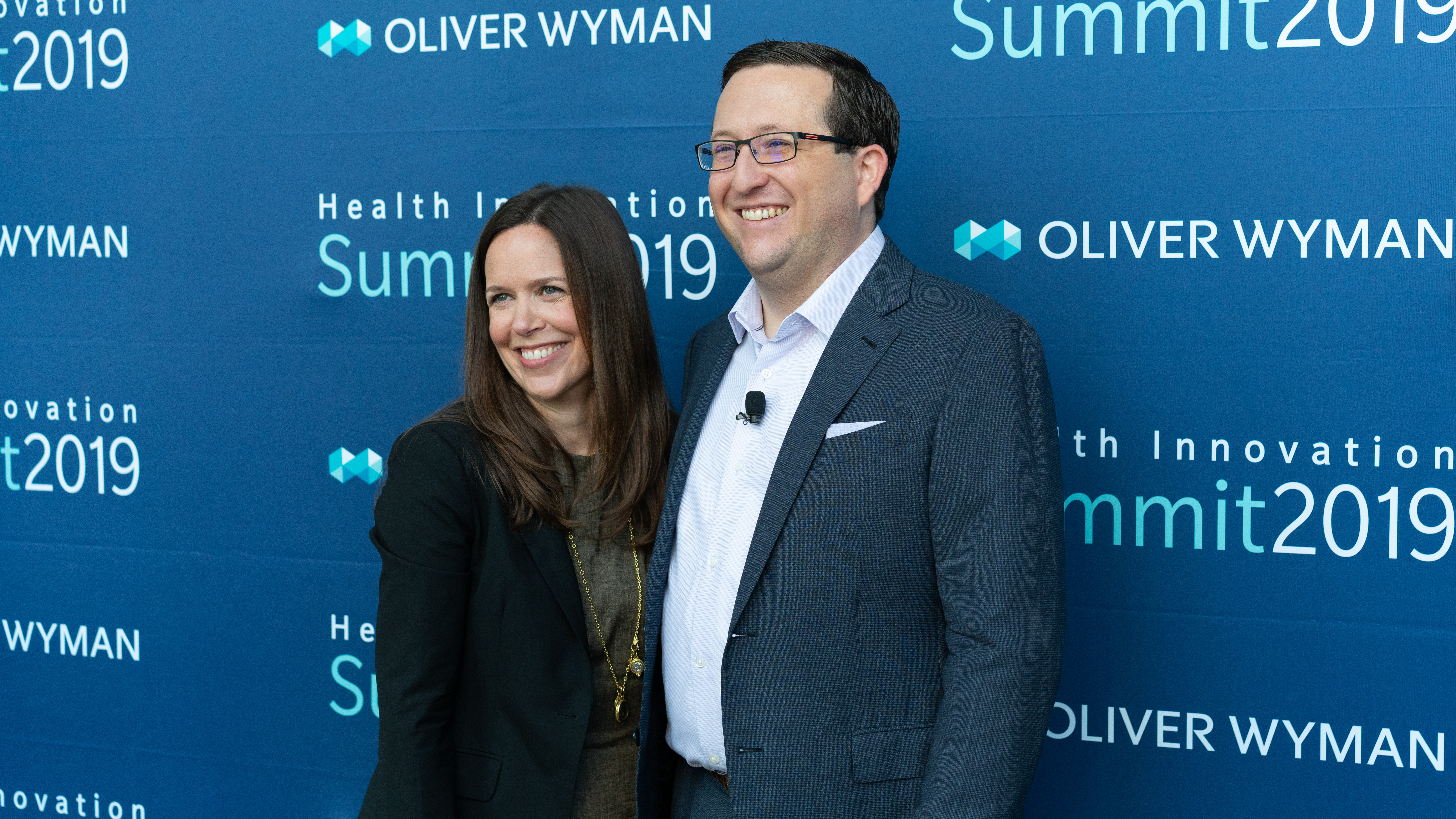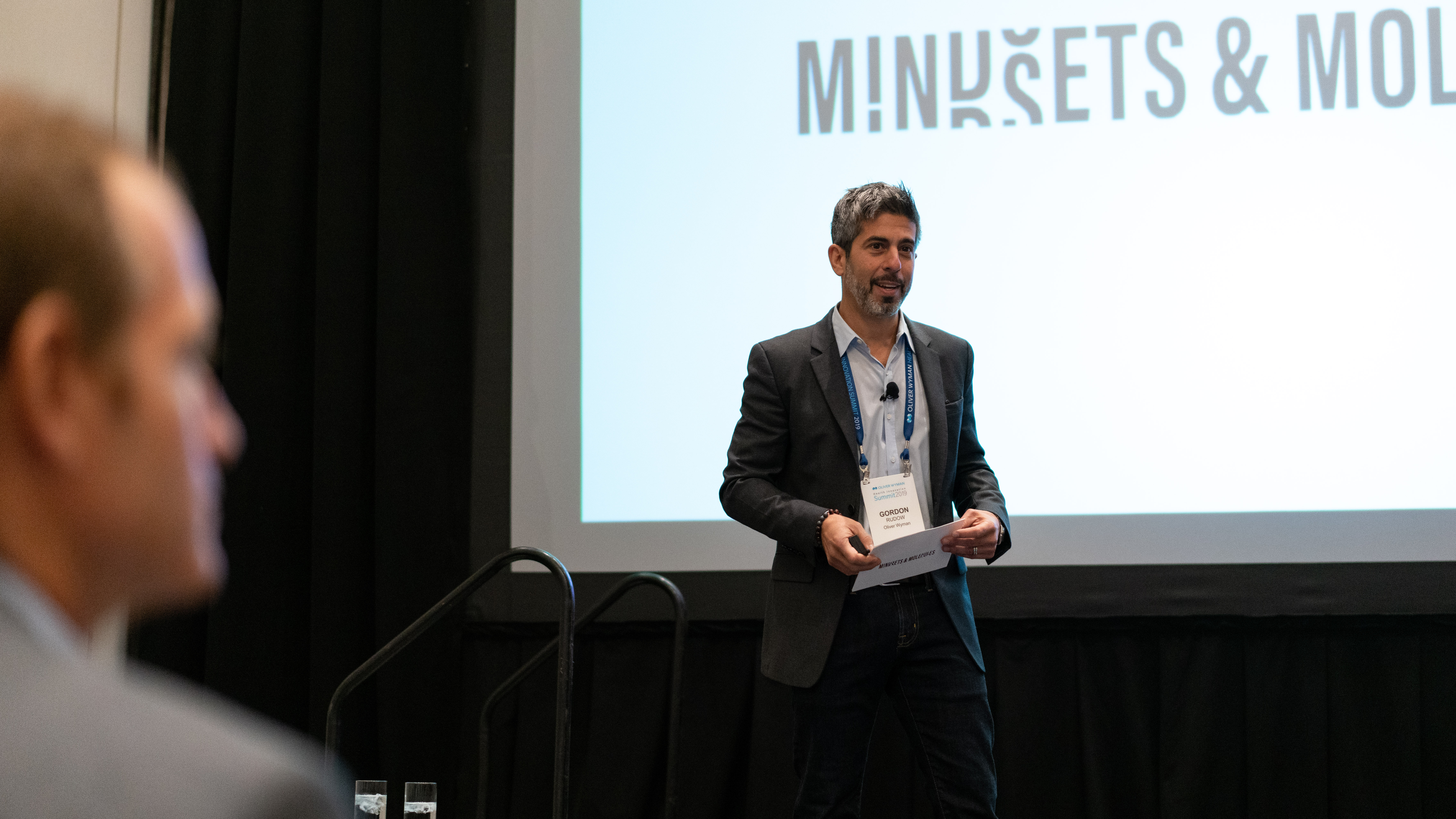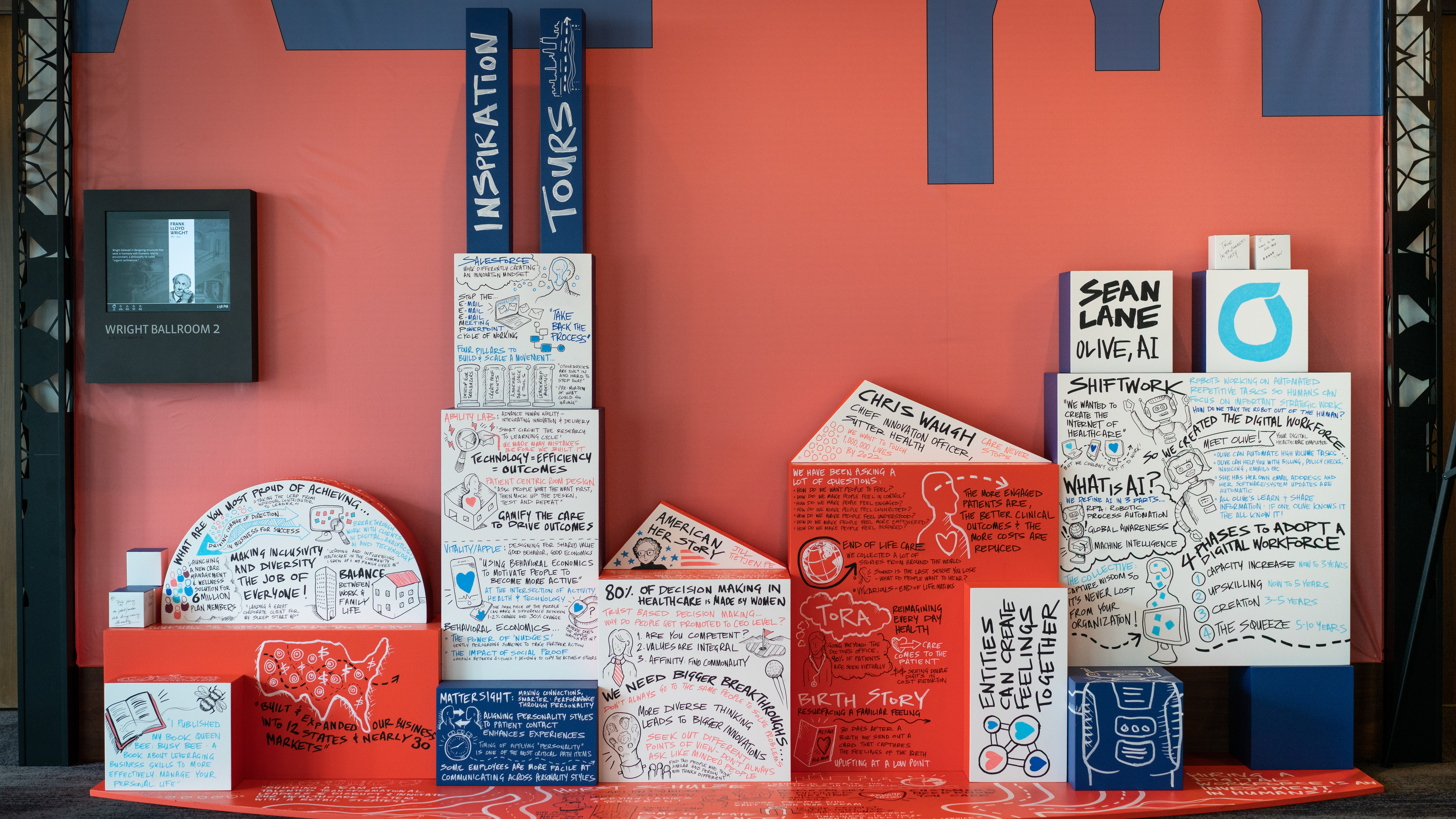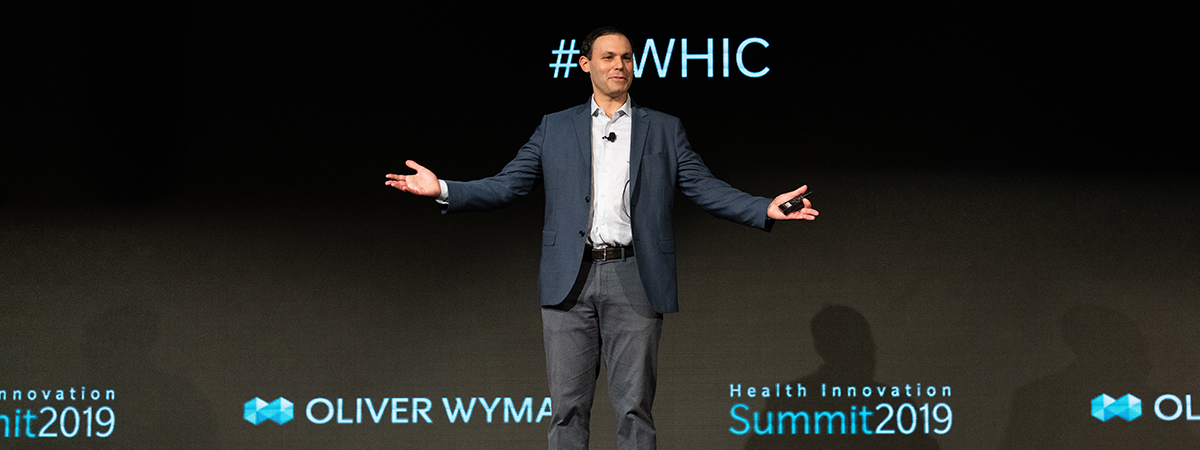We're reporting live from Chicago today, where it's day three of the seventh annual Oliver Wyman Health Innovation Summit (#OWHIC). Over 400 health industry senior executives from over 200 companies, 38 states, and 12 healthcare ecosystem sectors are convening over three days this week to discuss how to build for impact and design a new healthcare landscape. Here's more on what happened, what we learned, and what leaders had to say about how they're transforming care delivery.
What Main Stage Speakers Had to Say
1. We're still waiting for healthcare transformation.
Kicking off the morning main stage sessions was Josh Michelson, Partner and Co-Director of Oliver Wyman's Health Innovation Center. His address — It’s Time to Drive Impact — analyzed why traditional business models are no longer compatible with demographic realities, consumer needs, and company missions. When you step back, Josh said the healthcare industry appears to be saturated with breakthrough solutions filled with promise to transform care delivery. But even the greatest innovators perhaps have yet to drive meaningful change.
“We have a compass, but that compass is a fuzzy yardstick," said Josh. “Indicators of ‘progress’ do not equal impact.”
“If NPS is the new EPS, our dividends are hollow," he said. “We have created a de facto consumer market, but we have not equipped consumers to handle that burden of cost.”
“We know the system transformation levers. We must pull them much harder and faster," he emphasized.
2. The government is here to help. Really.
Next up, Sarah Iselin, Florida Blue's Executive Vice President of Government Programs and Diversified Business, led a main stage called — We're from the Government, and We're Here to Help. Really. Said Sarah, when you consider things like the Affordable Care Act or the Employee Retirement Income Security Act which both changed the status quo of healthcare, it's government that's responsible for creating this kind of step-change impact. Yet, healthcare leaders generally tend to perceive the government as something not worth embracing, and not tied to impact.
“The government is the largest payer in the US,” said Sarah. “I believe there is no force greater than government to achieve impact at scale."
The government’s role within the healthcare industry is quite pervasive and intimate, she emphasized. For instance, nearly 18 percent of GDP is tied to US healthcare. And nearly 40 percent of this amount is government spending.

3. Community health systems are the future of care delivery.
Next to take the main stage was Janice Nevin, MD, MPH, Christiana Care Health System's President and Chief Executive Officer. Her presentation — Buckle Up: Embracing Transformation Head On — emphasized how community health systems are in a league of their own. Although many healthcare leaders working to drive organizational and industry transformation struggle with things like outdated cultures and community pressures that bring transformational efforts to a standstill, Janice said she didn't let blocks like these deter her. Instead, she pivoted her system to value while improving quality, customer satisfaction, and leadership diversity, pushing attendees to do the same.
She stressed putting the care back in healthcare. “Nobody talks about love in healthcare," she said. "It's love that allows us to do the hard things. ... When we lead with love, excellence is inevitable."
"Buckle up. This is going to be an exciting, great, but really bumpy ride," she told attendees. "Always remember that we serve together with excellence and love.”
4. Pharma's hindrances aren't standing in the way of consumer breakthroughs.
Next up, was a session called: It Was the Best of Times, It Was the Worst of Times: Pharmacy’s Problems and Potential. Here, Julie Grant, Partner at Canaan Partners, Jeff Eberle, Chief Executive Officer at Truveris, and Rina Shah, Group Vice President of Specialty and Retail Pharmacy at Walgreens said consumer-friendly innovations are hitting the market, despite things like skyrocketing costs. These innovations, from investors launching pharma companies, to retailers expanding their footprints, to new data solutions, have great potential to become scalable.
“Almost as many people in the US have a rare disease as have diabetes," said Ashley.
“It’s a complex environment, even for the folks in the system delivering care. It’s opaque, specifically to the buyers and consumers. Historically, there’s a lack of alignment and trust. If you poll employers, only a third trust their pharmacy benefit managers,” said Jeff. “A near-term opportunity is creating more collaborative, less asymmetric information between parties.”
“There’s a real role for self-insured employers and large carriers. The nature of these complicated products and how they are administered is a multi-party negotiation,” added Julie. “For each portfolio, you’re going to see really different moves. It’s important how we all define 'specialty.'”
“The fact that we have products in the specialty community that technically should be in a traditional category is complicating the problem,” Rina said. “It’s the patient looking to get that life-saving treatment and afford it because we’re shifting the cost onto the patient. The government should be an advocate for this.”
5. Inequity is making healthcare something not all can access.
In the day’s fifth main stage session – called A Quantitative Solution to a Moral Problem – Duane Reynolds, the American Hospital Association’s President of the Institute for Diversity and Health Equity, emphasized how inequity is still making healthcare inaccessible and unaffordable for many patients across our communities. If innovations are only available to a select group of patients, progress really hasn’t been made in the first place. Innovations must be brought to those patients most in need.
“Sometimes we must remind ourselves that healthcare is about life and death,” Duane said. “But, it’s also about hope and opportunity.”
“Over 700 women each year die of pregnancy related complications in the US. Two-thirds of those deaths are preventable. Black women are three to four times more likely to die in childbirth regardless of education, income, or any other socioeconomic factors,” he said. “This is the tip of a spear of a moral crisis that is health inequity. But again, there is hope: the ability of hospitals and health systems to be system innovators.”
“The future of our health system relies on you, on your commitment, on your understanding, and on your leadership direction," he told attendees.
Leaders Learn about How Their Minds Really Work
Here are some key takeaways on our interactive exhibit on the art and science behind behavior change. Gordon Rudow, Senior Partner, Director of Organizational Engagement at Lippincott, urged leaders to take these four pieces of advice:
1. Lead with the heart
2. Be the change
3. Build for the journey
4. Make it a game

Interactive Sculpture Exhibit
At this year's event, Oliver Wyman built for impact...literally. Over the course of the Summit, key takeaways and insights were sketched onto an abstract skyline landscape to showcase our mission and commitment to redesigning healthcare.

In a second exhibit, our Summit partners shared how their organization creates impact. Through a spinnable grid, companies including Livongo, Softheon, Navvis, American Well, MedCity News, and Vitality highlighted key accomplishments, commitments, and missions to redefine the healthcare industry.
Coming Soon: New Oliver Wyman Health Podcasts
Ten new episodes of the Oliver Wyman Health Podcast, featuring executive conversations on the business of transforming healthcare, will be launched after the Summit. These episodes, on cutting-edge perspectives about behavioral health, Medicare Advantage, value-based care, digital treatments, consumer data, and more were recorded from the event and feature leaders' perspectives specifically tied to our executive sessions. We'll highlight leaders' views on how to redesign the healthcare landscape from companies and organizations like:
- ChenMed
- Alignment Healthcare
- Clover Health
- AbleTo
- SyncThink
- Click Therapeutics
- Privia Health
and more.
Subscribe to our podcast so you're notified when these new episodes go live.



